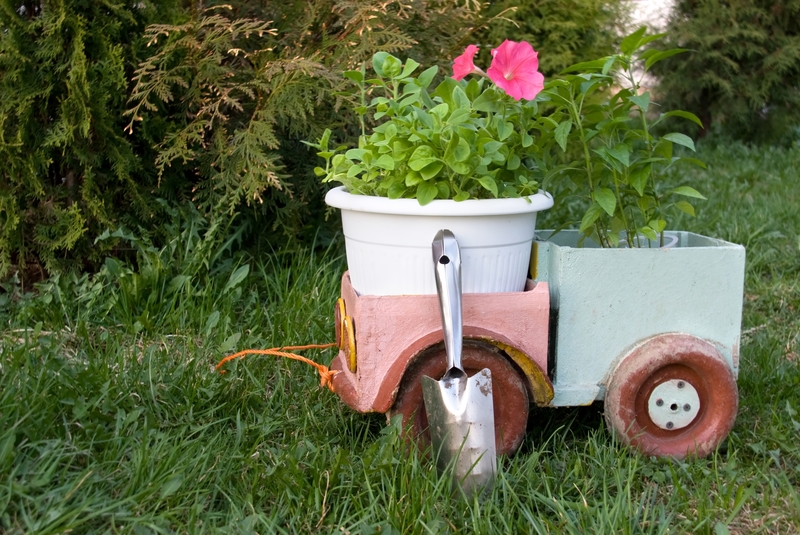From Closet Castaways to Fashion Finds: Recycling Old Apparel
Posted on 14/10/2025
From Closet Castaways to Fashion Finds: Recycling Old Apparel
Have you ever looked at your overstuffed closet and wondered what to do with the clothes you no longer wear? The journey from forgotten garments to treasured fashion finds can be surprisingly rewarding -- both for your wardrobe and the environment. In this comprehensive guide, we'll uncover the ins and outs of recycling old apparel, transforming would-be waste into chic, sustainable style statements.

Why Recycling Old Clothing Matters
The world of fashion is moving at lightning speed, and our closets often struggle to keep up. With trends evolving rapidly, clothing turnover has reached all-time highs. According to the Environmental Protection Agency (EPA), over 11 million tons of textile waste ends up in U.S. landfills annually. That's equivalent to about 70 pounds of clothing per person!
Environmental Impact
Discarded apparel doesn't just take up space -- it also impacts our planet. Textile production and disposal contribute significantly to pollution, greenhouse gas emissions, and water wastage. By recycling clothing, we can:
- Reduce landfill waste by giving fabrics a second chance.
- Conserve resources such as water and energy needed for new garments.
- Lower carbon footprint by decreasing the demand for new clothing production.
- Support a circular economy in the fashion industry.
Consumer Benefits
*Recycling unwanted clothes isn't just good for the environment -- it's also fabulously good for you.*
- Declutter your space to promote mental well-being.
- Refresh and revamp your style with unique, upcycled pieces.
- Save money by swapping, thrifting, or upcycling old apparel instead of buying new.
What Does Recycling Old Apparel Mean?
Recycling old clothing encompasses more than tossing tattered t-shirts in a bin. It involves the systematic process of collecting, sorting, repurposing, and reusing garments or their materials to extend their life cycle.
*Key Methods for Clothing Recycling*
- Donation to thrift stores, shelters, or nonprofits.
- Resale via consignment shops and online marketplaces.
- Upcycling -- creatively transforming garments into new fashion or household items.
- Textile recycling, where fabrics are processed into fibers for use in new products.
The Lifecycle of Apparel: From First Wear to Final Farewell
The average garment is worn fewer than 10 times before being discarded. By extending the life of your clothes by even nine months, studies show you can reduce their environmental footprint by 20-30%! Let's explore the journey of clothing as it transitions from closet castaway to newfound fashion.
1. Closet Clean-Out: The Starting Point
Start by evaluating your wardrobe. If you haven't worn something in over a year, it may be ready for a new life. Sort your items into:
- Keep: Items you love and wear regularly.
- Repair: Pieces with potential after minor fixes.
- Repurpose: Garments suitable for upcycling projects.
- Release: Items ready to be recycled, donated, or resold.
2. Donation: Pass on the Value
One of the simplest forms of recycling used clothing is donation. Consider:
- Local thrift stores and charity shops
- Homeless shelters and women's refuges
- Specialty charities (e.g., Dress for Success, Soles4Souls)
Before donating, ensure clothes are clean and in good repair. Your pre-loved apparel could become a fashion find for someone in need.
3. Resale: Turning Castoffs into Cash
Some clothes are simply too valuable to give away! Platforms like Depop, Poshmark, eBay, and local consignment stores make it easy to sell gently used apparel. Vintage and designer finds can attract premium prices while also helping reduce textile waste.
4. Upcycling: Creative Transformation of Old Clothes
*When it comes to sustainable style, creativity is your best friend.* Upcycling lets you reimagine and redesign old garments. Examples include:
- Turning jeans into shorts or bags
- Patchworking sweaters or t-shirts
- Adding artistic embellishments like embroidery, patches, or tie-dye
- Using fabric scraps for quilts, pillows, or pet toys
Upcycling isn't just about keeping waste out of landfill -- it's about creating truly unique fashion finds that reflect your individual style.
5. Textile Recycling: Giving Fabric a New Lease on Life
Clothes that are too worn out for wear or resale can still be useful. Many communities offer textile recycling programs. Textiles can be shredded into fibers for use in:
- Industrial rags
- Carpet padding
- Stuffing for insulation or furniture
- New yarns and fabrics
This form of clothing recycling is a powerful way to reduce landfill waste and conserve resources.
Where and How to Recycle Old Apparel
Drop-Off & Collection Points
*Many retailers and local governments have recognized the importance of apparel recycling.* Here are a few places to recycle your castoffs:
- Retail Take-Back Programs: Brands like H&M, Levi's, The North Face, and Uniqlo accept old clothes for recycling (sometimes in exchange for discounts!).
- Municipal Recycling Centers: Check if your city offers curbside textile recycling collections or designated drop-off points.
- Nonprofit Initiatives: Organizations such as Planet Aid, Goodwill, and The Salvation Army operate thousands of clothing donation bins worldwide.
Reselling and Online Marketplaces
For higher-end, vintage, or specialty items, use online platforms like:
- ThredUP
- Depop
- eBay
- Vestiaire Collective
Take clear photos, write honest descriptions, and set fair prices to transform your past fashion into someone else's next find.
Community Swaps and Clothing Exchanges
Why not turn old clothes into communal treasures? Hosting or joining a clothing swap event ensures that every garment gets a shot at new life while fostering community connection. Search online or organize a "swap party" with friends and neighbors!
Innovative Approaches to Apparel Recycling
Circular Fashion: Designing for Recycling
Modern brands are increasingly focused on the circular economy. This means creating products that are easy to recycle or upcycle -- for example, using mono-materials so that garments can be more easily broken down at the end of their life cycle. Major companies like Patagonia and Stella McCartney are leading the way in sustainable design.
Textile-to-Textile Recycling
New recycling technologies allow post-consumer apparel to be chemically processed into fibers used for new clothes. While still in its early stages, this process has the potential to significantly decrease fashion's environmental impact.
Step-by-Step Guide: How to Recycle Your Old Apparel
Evaluate & Sort Your Clothes
- Inspect for wear and tear. Clothes that are damaged but clean may still be suitable for textile recycling or upcycling.
- Set aside designer or high-quality pieces for resale. Branded apparel often fetches higher prices on resale markets.
- Chunk basics (t-shirts, socks) for donation or fabric recycling.
Choose Your Recycling Route
- Donation for items still in good condition.
- Resale for trendy, vintage, or designer pieces.
- Upcycle to create new fashion finds for yourself or others.
- Recycle at dedicated textile centers for irreparably worn garments.
Prepare Your Clothes for Their Next Life
- Wash items before donating, selling, or recycling.
- Remove personal items from pockets.
- Repair minor damages -- a missing button or loose seam can make a big difference!
Creative Upcycling Ideas: Turn Castaways into Chic Fashion Finds
Want inspiration for transforming your old apparel? Here are some fun ideas:
- Jeans: Convert into shorts, tote bags, or coasters.
- T-Shirts: Turn into crop tops, pillowcases, or braided rugs.
- Sweaters: Make leg warmers, hats, or mittens.
- Dresses/Shirts: Craft aprons, wraps, or even quilts.
With a little creativity, yesterday's fashion can become tomorrow's treasure.

The Future of Fashion: Towards a Sustainable Wardrobe
The global fashion industry is gradually embracing sustainability and responsible garment disposal. As consumers, our choices matter. By recycling old clothing, we can reduce waste, save resources, and support a greener future.
How You Can Make a Difference:
- Choose quality over quantity when shopping for new clothes.
- Support sustainable and ethical fashion brands.
- Practice mindful purchasing and only buy what you truly need.
- Upcycle, donate, or recycle your old apparel instead of throwing it away.
Conclusion: Make Recycling Old Apparel Your New Fashion Statement
From closet castaways to fashion finds, the path to sustainable style is paved with mindful action, creativity, and community. *Recycling old clothing* is not just a trend - it's a responsibility and an opportunity to make your wardrobe, and the world, a better place. Your next favorite piece might just be hiding in your own closet, waiting for a second chance.
Transform your approach to fashion today by embracing the art of recycling old apparel!
Share Your Journey!
Have you given your old clothes a new life? Tag your upcycled creations on social media and inspire others to turn their closet castaways into stunning fashion finds.

